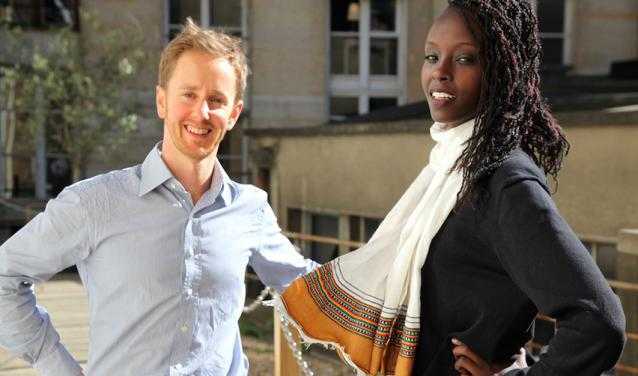Home>Thirty-something and happy to be back at university

31.10.2016
Thirty-something and happy to be back at university
Sheila Mutimbo and Patrick Blake are public policy professionals in their thirties. After several years of rich professional experience, they both decided that it was time to take a break and to go back to university. They have just started the one-year Master’s programme in Advanced Global Studies at the Sciences Po Paris School of International Affairs and were pleased to share their first impressions and expectations.
You both hold positions of responsibility, Sheila at the Ministry of Finance and Economic Planning in Rwanda and Patrick at the Australian Department of Foreign Affairs and Trade. Why did you both choose to go on leave?
Sheila Mutimbo: I’ve been working with the Ministry of Finance and Economic Planning in Rwanda for three years now, and I felt that in order to advance my practical skills I need to deepen my academic expertise by ultimately becoming an expert in the development work.
Patrick Blake: I have been in the same ministry for nine years, so I thought that it was time for me to take time out. My organisation encourages officers to develop their intellectual framework. I wanted to take a step back to gain a different perspective on global issues.
Sheila, you did your studies in China, and Patrick in Australia. Why did you choose France and Sciences Po for your return to university?
Sheila: I have an African and Asian background, I believe by combining these three continental experiences (France-Europe), I will be able to have wider worldview and perhaps be in a better position to contribute to solutions for sustainable development.
And why France? First because Sciences Po has a good reputation and I guess learning french in France is ideal. But also I enjoy experiencing different cultures, France is totally different to any African or Asian country I’ve been to, these differences intrigue me.
Patrick: The possibility of earning a Master’s in only one year really appealed to me. It’s sometimes difficult to take a two-year break, for financial reasons among others… So a one-year Master’s programme fits my plans perfectly. The good reputation of Sciences Po also motivated my choice.
You have just started the one-year programme in Advanced Global Studies at the Sciences Po Paris School of International Affairs. What are your first impressions?
Sheila: I am in the Development Practice track. It has been very intense, with the assignments and all the readings we have to do. But we have some very interesting classes; they are quite challenging which I don’t mind! I like the programme’s cross disciplinary approach. For example, when we talk about development, the professor may use some economic concepts, and even if you are not a specialist in this discipline, the notions are accessible, the level is well adapted for non-specialists. And I also like that we can easily interact with the professor.
Patrick: It is a big change for us I guess. We have been working for a while, and it is interesting to plunge into the academic world. I wanted to take time out after nine years or work. But despite calling it “time out”, it is still very challenging. We have a lot of reading to do, a lot of assignments and exam preparation.
What do you expect from this year of study at Sciences Po? Which skills do you need to develop?
Sheila: I want to sharpen my ability to think critically and to be able to contextualise all the information I get here to the environment I come from in Rwanda. For example how can I use the principles of sustainable development learned at Sciences Po to support already on-going sustainable policies in Rwanda? This question is the focus of my time here. In most cases it is difficult to apply theory to the field, however i look forward to understanding the practicalities of that.
Patrick: I am interested in being able to better analyse economic research. I want to be able to criticise these documents and gain a better understanding of the work of economists.
I want to understand globalisation from both an academic and a practical viewpoint. I’m also taking up Japanese. I stopped learning Japanese when I was 16 and now I am doing Japanese again, with a fantastic and engaging Japanese professor.
Related links
Learn more about the Master in Advanced Global Studies at the Sciences Po Paris School of International Affairs
Learn more about one-year Master’s programmes at Sciences Po